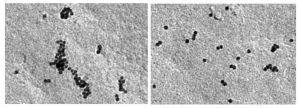Investigadores del Consejo Superior de Investigaciones Científicas liderados por el investigador Santos Mañes del Centro Nacional de Biotecnología (CNB-CSIC) han descubierto una nueva función de CCR5 que explicaría por qué el sistema inmune no funciona adecuadamente en individuos con deficiencias en CCR5 que se enfrentan a ciertas infecciones virales o están bajo tratamientos de inmunoterapia. El trabajo, publicado en la revista EMBO Journal, muestra los datos obtenidos en un modelo de vacunación experimental en ratones, pero también en linfocitos CD4+ aislados de individuos ccr5[delta]32.
Raquel Blanco, investigadora del CNB-CSIC explica que “en ratones que carecen de CCR5 se producen menos citoquinas y anticuerpos de alta afinidad en respuesta a una segunda exposición al antígeno, es decir, no tienen una memoria eficiente para la protección a largo plazo”. Para Ana Martín Leal , co-autora de la investigación, esto se debe a que “CCR5 es necesario para que el receptor de las células T (TCR) forme nanooligómeros o nanoclusters, que favorecen la re-activación de los linfocitos CD4+ de memoria a bajas dosis de antígeno”. Además, este mismo fenómeno se observó en linfocitos CD4 aislados de individuos ccr5[delta]32, sugiriendo que sus respuestas de memoria también pueden ser defectuosas.
Estos nuevos datos podrían indicar que las personas portadoras del polimorfismo ccr5[delta]32 o de otros que afectan a CCR5 presentan respuestas inmunes deficientes frente a algunos virus. Asimismo, abren una nueva línea de investigación para determinar si los individuos con polimorfismos de CCR5 generan respuestas de anticuerpos protectores efectivas tras ser vacunados contra virus, como el de la gripe o, en un futuro, el virus causante de COVID-19.
En este trabajo, además de los científicos del CNB-CSIC, han participado investigadores del Centro de Biología Molecular Severo Ochoa (CBMSO-CSIC-UAM), del Instituto de Química Avanzada de Cataluña, de la Universidad de Freiburg, de la Escuela Técnica Superior de Ingeniería de la Universidad Pontificia Comillas de Madrid, del Hospital de Valme, de los CIBER de enfermedades hepáticas y digestivas (CIBER-EDH) y enfermedades neurodegenerativas (CIBERNED), de la Fundació ACE de Barcelona, y de la empresa bioinformática sevillana CAEBI.
Más información:
CCR5 deficiency impairs CD4+ T cell memory responses and antigenic sensitivity through increased ceramide synthesis. Ana Martín-Leal, Raquel Blanco, Josefina Casas, María E. Sáez, Elena Rodríguez-Bovolenta, Itziar de Rojas, Carina Drechsler, Luis Miguel Real, Gemma Fabrias, Agustín Ruíz, Mario Castro, Wolfgang W.A. Schamel, Balbino Alarcón, Hisse M. van Santen, Santos Mañes. EMBO Journal 2020 e104749
DOI: doi.org/10.15252/embj.2020104749






